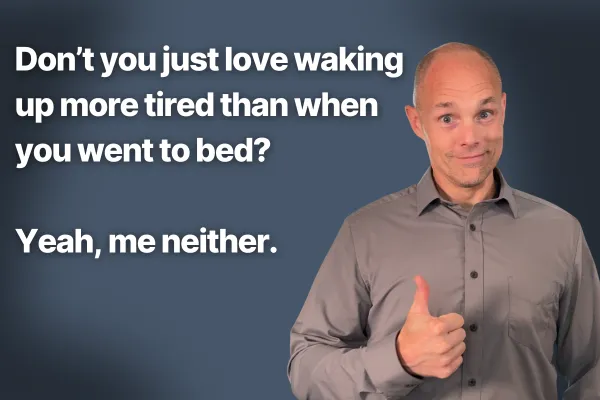
Revitalize Your Life: How to Reclaim Your Energy and Stop Feeling Like a Zombie
Ever feel like you’re dragging through your day with all the enthusiasm of a zombie? You’re not alone. In fact, if you’re anything like "Mark the Midlife Maverick," you’ve likely felt the relentless fatigue that makes every task feel like climbing Everest. It’s frustrating, draining, and frankly, it’s stealing your life from you. But here’s the good news: you don’t have to live this way. By understanding the root causes of your exhaustion and making targeted changes, you can stop feeling like a zombie and get your energy back. Let’s explore how.
The Reality of Midlife Fatigue: A Wake-Up Call
Imagine this: you wake up in the morning, but instead of feeling refreshed, you’re already exhausted. Your energy reserves are on empty before the day even begins. Sound familiar? This is a common scenario for many people in their midlife years, especially those like Mark who are juggling demanding careers, family responsibilities, and the creeping effects of aging.
You’re dealing with more than just a little tiredness; it’s a bone-deep weariness that affects every aspect of your life. Your job performance, your relationships, and your own sense of well-being are all under siege. What’s worse, it feels like no matter what you do, nothing changes. Sleep more, drink another coffee, try a new diet—it’s just a temporary fix for a problem that keeps coming back.
This persistent fatigue can stem from several sources, but one of the most overlooked is male andropause, or what’s commonly known as "low testosterone." Yes, it’s a thing, and no, it’s not just about sex drive. Testosterone plays a crucial role in your overall energy levels, mental clarity, and even your ability to build muscle and maintain a healthy weight. When those levels drop, so does your vitality.
But low testosterone isn’t the only culprit. Poor sleep, chronic stress, nutritional deficiencies, and a lack of exercise all contribute to the vicious cycle of fatigue. The good news? Once you identify the root causes, you can take targeted action to reclaim your energy and start living fully again.
Uncovering the Culprits: What’s Draining Your Energy?
Before we dive into how to fix your energy issues, let’s get to the bottom of what’s causing them. It’s like trying to fix a leaky boat—you need to find the holes before you can patch them up.
1. Hormonal Imbalances: The Silent Saboteur
Low testosterone, thyroid dysfunction, and cortisol imbalances can all wreak havoc on your energy levels. Testosterone isn’t just about masculinity; it’s a hormone that affects your entire body, influencing everything from mood to muscle mass. When testosterone levels decline, you’re left feeling sluggish, irritable, and just plain off.
2. Nutritional Deficiencies: The Empty Tank
You are what you eat, right? Well, if your diet is lacking in essential nutrients, it’s no wonder you’re feeling drained. Deficiencies in key vitamins and minerals—like Vitamin D, B vitamins, magnesium, and iron—can leave you running on fumes. Your body needs the right fuel to function at its best, and if it’s not getting it, you’ll feel it.
3. Chronic Stress: The Invisible Weight
Stress is an energy vampire. It sneaks up on you, slowly draining your reserves until there’s nothing left. Chronic stress leads to elevated cortisol levels, which can disrupt your sleep, affect your mood, and even cause weight gain—all of which contribute to fatigue.
4. Poor Sleep: The Sabotaged Recharge
Think of sleep as your body’s way of recharging its batteries. If you’re not getting enough quality sleep, or if your sleep is constantly interrupted, you’re not recharging fully. This leads to a vicious cycle where lack of sleep causes fatigue, which makes it harder to sleep, and so on.
5. Lack of Physical Activity: The Stagnation Trap
It might seem counterintuitive, but the less you move, the more tired you’ll feel. Exercise is like a natural energy booster—it improves circulation, increases oxygen flow, and releases endorphins that make you feel good. When you skip out on regular physical activity, your body slips into a state of stagnation, making it harder to shake off that fatigue.
Reclaiming Your Energy: Practical Steps to Take Back Your Life
The key to stopping the zombie-like existence isn’t in a magic pill or the latest fad diet. It’s about making sustainable changes that address the root causes of your fatigue. Here’s how you can start:
1. Balance Your Hormones
Hormonal imbalances, especially low testosterone, can be a major drain on your energy. If you suspect your hormones are out of whack, the first step is to get tested. Once you know where your levels stand, you can take steps to balance them.
Consider Natural Supplements: It's hard to pinpoint what your body needs without testing. Supporting functional foundations with a multi vitamin, vitamin D, and fish oil are a great start. However, to tackle deeper rooted challenges requires targeted supported beyond the foundations of this article.
Prioritize Sleep: Testosterone production primarily occurs during sleep, so improving your sleep quality is crucial.
Exercise Regularly: Strength training, in particular, can help boost testosterone production.
2. Optimize Your Nutrition
What you put into your body directly affects your energy levels. If your diet is lacking in essential nutrients, it’s time to make some changes.
Eat a Balanced Diet: Focus on high energy foods, lean proteins, healthy fats, and support vegetables. Avoid processed foods that are grain based, high in sugar, and have unhealthy fats.
Supplement Smartly: If your diet isn’t providing all the nutrients you need, consider adding supplements. Vitamin D, B-complex vitamins, magnesium, and omega-3 fatty acids are all critical for energy production.
Stay Hydrated: Dehydration can sap your energy fast. Make sure you’re drinking plenty of water throughout the day.
3. Manage Stress Effectively
Chronic stress can be a major energy drain, but it’s also one of the hardest things to manage.
Practice Mindfulness: Techniques like meditation, deep breathing, and yoga can help reduce stress and promote relaxation.
Set Boundaries: Learn to say no to avoid overcommitting yourself, which can lead to burnout.
Find a Hobby: Engaging in activities you enjoy can be a great way to unwind and relieve stress.
4. Improve Your Sleep Hygiene
If you’re not getting enough quality sleep, it’s going to be hard to feel energetic, no matter what else you do.
Stick to a Schedule: Try to go to bed and wake up at the same time every day, even on weekends.
Create a Bedtime Routine: Wind down before bed with relaxing activities like reading or taking a warm bath.
Optimize Your Sleep Environment: Keep your bedroom cool, dark, and quiet. Invest in a good mattress and pillows.
5. Incorporate Regular Exercise
Exercise might be the last thing you want to do when you’re tired, but it’s actually one of the best ways to boost your energy.
Start Small: If you’re not used to regular exercise, start with something manageable, like a daily walk.
Mix It Up: Combine cardio, strength training, and flexibility exercises to get the most benefits.
Stay Consistent: Aim for at least 30 minutes of moderate exercise most days of the week.
The Power of Small Wins: Building Momentum
Reclaiming your energy isn’t about making one big change; it’s about making a series of small, sustainable changes that add up over time. Each time you make a healthy choice, you’re building momentum toward a more energized and vibrant life.
Start with one area—maybe it’s improving your sleep or tweaking your diet—and focus on that for a week or two. Once you’ve got that down, move on to the next area. Over time, these small wins will add up, and you’ll start to notice a big difference in how you feel.
It’s also important to remember that progress isn’t always linear. There will be days when you feel like you’ve taken a step backward, and that’s okay. What matters is that you keep moving forward. Every small step you take is bringing you closer to reclaiming your energy and your life.
The Road Ahead: Embracing Your New Normal
As you begin to make these changes, you’ll start to notice a shift—not just in your energy levels, but in your overall quality of life. Tasks that once felt overwhelming will become manageable. You’ll start to feel more present and engaged in your relationships. Your productivity at work will improve, and you’ll find that you have more time and energy for the things you love.
But perhaps the most significant change will be in how you feel about yourself. Reclaiming your energy is about more than just shaking off fatigue—it’s about reclaiming your life. It’s about waking up each day feeling like the best version of yourself, ready to take on whatever comes your way.
You deserve to feel energized, confident, and in control of your life. By taking the steps to address the root causes of your fatigue, you can stop feeling like a zombie and start living fully again. The road ahead is one of possibility and promise, and it all starts with taking that first step.
Actionable Steps to Reclaim Your Energy
If you’re ready to stop feeling like a zombie and start reclaiming your energy, here are some actionable steps to get you started:
Get Your Hormones Tested: Visit a healthcare professional to check your testosterone, thyroid, and cortisol levels.
Revamp Your Diet: Focus on high energy whole foods, lean proteins, and healthy fats. Consider supplements if needed.
Create a Sleep Routine: Go to bed and wake up at the same time each day, and develop a calming bedtime routine.
Incorporate Regular Exercise: Aim for 30 minutes of moderate exercise most days of the week.
Practice Stress Management: Try mindfulness techniques like meditation or yoga, and make time for activities you enjoy.
FAQs About Reclaiming Your Energy
1. What are the most common causes of low energy in midlife?
The most common causes of low energy in midlife include hormonal imbalances (such as low testosterone and thyroid dysfunction), nutritional deficiencies, chronic stress, poor sleep, and a lack of regular physical activity. Addressing these issues with targeted strategies can help restore energy levels.
2. How can I naturally boost my testosterone levels?
You can naturally boost your testosterone levels by incorporating strength training into your routine, ensuring you get enough sleep, and considering natural supplements like astaxanthin, pomegranate seed extract, and phosphatidylserine. Additionally, managing stress and maintaining a healthy diet can support healthy testosterone levels.
3. What should I eat to improve my energy levels?
To improve your energy levels, focus on energy rich foods - high energy proteins, healthy fats, and a rotation of vegetables. Avoid processed foods and high-sugar snacks, which can cause energy crashes. Consider supplementing with vitamins, minerals, and antioxidants if your diet lacks certain nutrients.
4. How important is sleep in maintaining energy levels?
Sleep is crucial for maintaining energy levels. It’s during sleep that your body repairs itself, balances hormones, and recharges. Poor sleep or lack of sleep can lead to chronic fatigue, mood disturbances, and impaired cognitive function. Prioritizing good sleep hygiene is essential for sustained energy.
5. What are some quick tips for managing stress?
Quick tips for managing stress include practicing mindfulness techniques such as deep breathing, meditation, or yoga; setting clear boundaries to avoid overcommitting; engaging in regular physical activity; and finding hobbies that help you relax and unwind. It’s also important to ensure you’re getting enough rest and taking breaks when needed.
Remember, the journey to reclaiming your energy is a marathon, not a sprint. Take it one step at a time, and before you know it, you’ll be back to feeling like your vibrant, energized self.
How can I help?
Download a copy of 'Unlock Your Midlife Edge: Why Your Testosterone Levels May Be Ruining Your Life (and How to Fix It Fast)'
Start your Testosterone Fix Strategy Assessment




